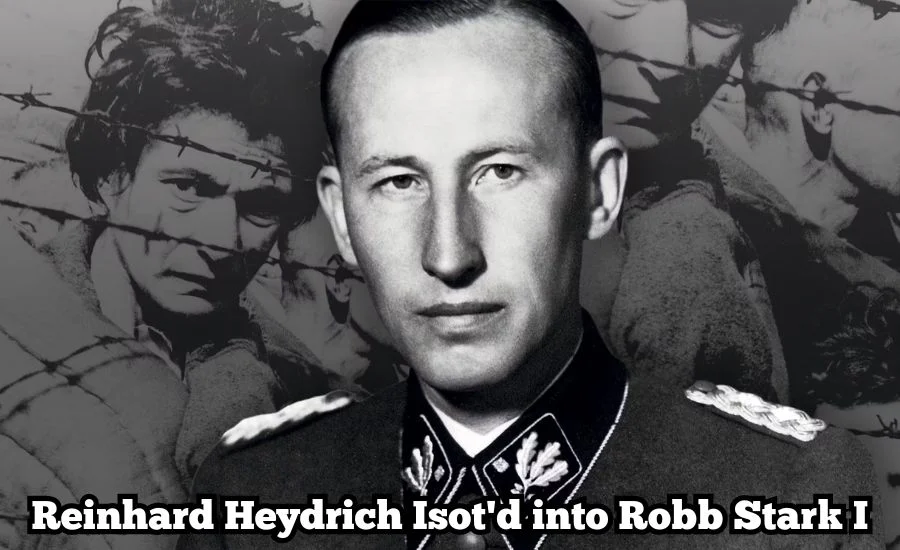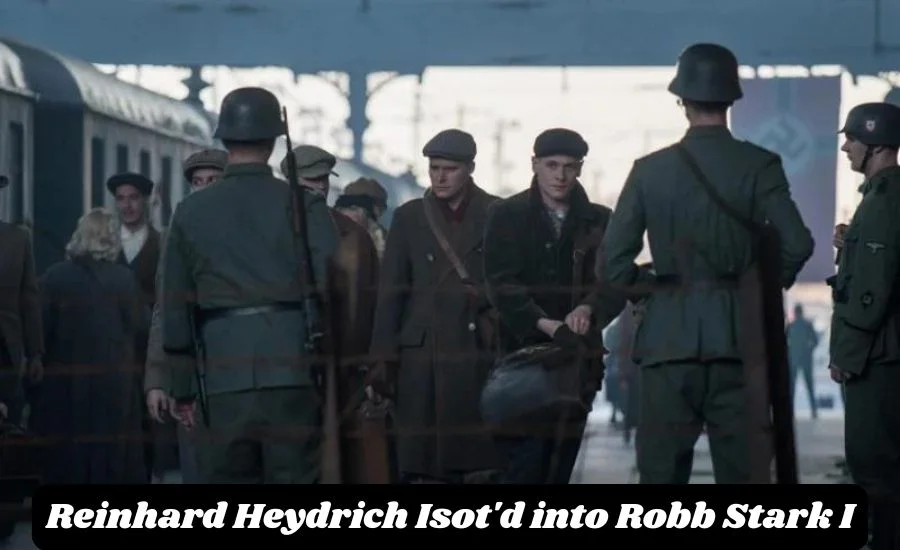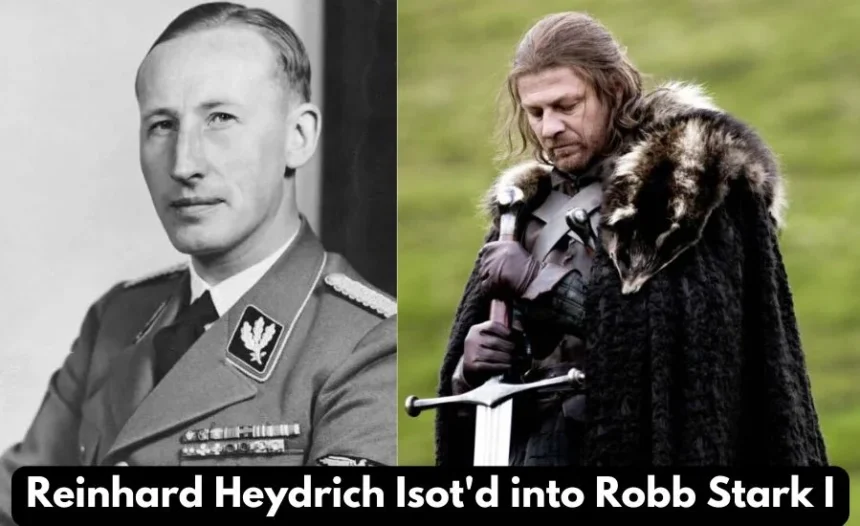Reinhard Heydrich is a name that echoes through history, representing one of the darkest periods in human existence. A key figure in the Nazi regime, his chilling legacy continues to provoke discussion and analysis. But what if we took this historical character and placed him into the realm of fiction? Imagine Reinhard Heydrich isot’d into Robb Stark from “Game of Thrones.” It’s an intriguing thought experiment that blends reality with fantasy, illuminating both characters’ complexities.
Robb Stark, known for his nobility and tragic fate, stands in stark contrast to Heydrich’s ruthless ambition. In exploring this unique intersection between two disparate worlds—one steeped in horrifying reality and the other woven with myth—we can uncover deeper insights about power, morality, and leadership. Buckle up as we dive deep into these characters’ lives, their intertwining fates, and what it means when history meets fiction!
Who was Reinhard Heydrich?
Reinhard Heydrich Isot’d Into Robb Stark was a prominent figure in Nazi Germany, known for his chilling efficiency and ruthless ambition. Born on March 7, 1904, in Halle an der Saale, Germany, he rose through the ranks of the SS to become one of Adolf Hitler’s closest confidants.
Often referred to as “the Man with the Iron Heart,” Heydrich played a crucial role in orchestrating some of the regime’s most horrific policies. His cold demeanor and strategic mind made him a feared leader within both military and political circles.
Heydrich’s early career included service in World War I and later involvement with intelligence operations. He quickly became a key architect behind many atrocities committed during the Holocaust. His legacy remains controversial—a mixture of admiration for his intellect and horror at his actions.
His role in the Nazi party
Reinhard Heydrich Isot’d Into Robb Stark was a key figure within the Nazi Party, known for his ruthless efficiency and chilling intellect. As the chief of the Reich Main Security Office, he orchestrated many of the party’s most sinister operations.
His role extended beyond mere enforcement; he was instrumental in shaping policies that targeted Jews and other minorities. With an iron grip on security forces, Heydrich created an atmosphere of terror across Germany and occupied territories.
Heydrich also played a pivotal role in organizing the infamous Wannsee Conference, where plans for the Final Solution were formalized. His cold demeanor earned him nicknames like “The Butcher of Prague,” reflecting both fear and respect from allies and adversaries alike.
In essence, his influence helped to solidify some of the darkest chapters in history under Hitler’s regime. The legacy left by Heydrich serves as a haunting reminder of how power can be wielded destructively when combined with fanaticism.
Rise to power and relationship with Adolf Hitler

Reinhard Heydrich’s ascent within the Nazi regime was both swift and strategic. His keen intellect and ruthless ambition caught the attention of key figures, including Adolf Hitler himself. Heydrich skillfully navigated the treacherous waters of party politics.
His relationship with Hitler blossomed into a partnership rooted in mutual respect for each other’s determination. The two shared an unwavering vision for a brutal new order. This connection was pivotal as it enabled Heydrich to secure significant power within the SS.
Hitler relied on him not only for administrative tasks but also for his unyielding loyalty. Their bond facilitated some of World War II’s most heinous acts, showcasing how personal relationships can intertwine with historical events, shaping their horrific legacy together through sheer will and brutality.
Heydrich’s involvement in the Holocaust
Reinhard Heydrich played a crucial role in orchestrating the Holocaust, one of history’s darkest chapters. As chief of the Reich Main Security Office, he was instrumental in implementing Nazi policies aimed at exterminating Jews and other targeted groups.
Heydrich convened the Wannsee Conference in January 1942. This meeting laid out plans for what they termed the “Final Solution.” Leaders from various government departments gathered to discuss logistics and coordination.
His ruthless efficiency earned him nicknames like “The Butcher of Prague.” Under his direction, mass deportations began. Concentration camps expanded rapidly, becoming sites of unimaginable suffering.
Heydrich’s ideology combined fervent nationalism with brutal anti-Semitism. His vision was chillingly systematic; entire communities were erased without remorse or hesitation. The legacy of his actions left scars that still resonate today as a reminder of humanity’s capacity for cruelty.
Assassination and legacy
Reinhard Heydrich’s life came to a violent end on June 4, 1942. Assassinated in Prague, he was targeted by Czechoslovak operatives in a daring mission known as Operation Anthropoid.
The attack left him gravely injured. He succumbed to his wounds days later, marking the demise of one of history’s most infamous figures.
Heydrich’s assassination sparked brutal reprisals from the Nazis. The village of Lidice was razed as punishment, illustrating the regime’s ruthless nature.
His legacy is complex and haunting. As a key architect of the Holocaust, he epitomized cruelty and ambition within an oppressive regime.
Posthumously, Heydrich has become an emblem for discussions about evil and authoritarianism. His actions continue to provoke debates about morality and power dynamics throughout history.
The chilling impact of his legacy permeates both historical narratives and popular culture today, keeping his story alive through various mediums.
The connection to Robb Stark in Game of Thrones
Reinhard Heydrich’s chilling legacy finds an unexpected echo in the character of Robb Stark from Game of Thrones. While one lived during a dark chapter of history, the other exists within a realm filled with political intrigue and moral dilemmas.
Robb Stark embodies honor and loyalty, yet he faces betrayal at every turn. This mirrors Heydrich’s ruthless ambition within the Nazi party. Both figures navigated treacherous environments where trust was scarce.
Heydrich’s cold calculations led to immense suffering, while Robb’s decisions often stem from a place of integrity that ultimately leads to tragedy. The contrast between their motivations raises questions about leadership and morality.
Through this lens, we see how fiction can reflect real-life horrors while exploring themes like power dynamics and sacrifice. The stark differences between them create a compelling dialogue on what it means to lead under dire circumstances.
Comparison between the two characters and their impact on history/fiction
Reinhard Heydrich Isot’d Into Robb Starkk, though from vastly different worlds, share intriguing similarities in their narratives.
Heydrich was a chilling figure of power within the Nazi regime. His cold calculations contributed to horrific real-world events like the Holocaust. He instilled fear and commanded loyalty with ruthless efficiency.
Conversely, Robb Stark embodies honor and nobility in “Game of Thrones.” As a leader striving for justice, he wields his sword not just as a weapon but as a symbol of hope for his people.
Their impact diverges sharply; while Heydrich’s legacy is one stained by bloodshed and tyranny, Robb’s story revolves around themes of sacrifice and betrayal.
Both characters evoke powerful responses from audiences—whether it be dread or admiration—and highlight contrasting aspects of leadership: tyranny versus honor.
Reinhard Heydrich Isot’d Into Robb Stark: A Top N Analysis
The concept of Reinhard Heydrich isot’d into Robb Stark presents an intriguing narrative fusion between historical and fictional realms. Both figures symbolize leadership under dire circumstances, yet they navigate vastly different worlds.
Heydrich’s chilling efficiency in the Nazi regime contrasts sharply with Robb Stark’s idealistic quest for honor and justice. While Heydrich orchestrated terror during the Holocaust, Robb fought valiantly against tyranny in Westeros.
This analysis reveals how each character embodies a unique brand of authority. Heydrich’s cold pragmatism stands opposed to Robb’s emotional intelligence and loyalty to his family. Their stories delve into themes of power, morality, and legacy.
Exploring their distinct paths deepens our understanding of what it means to lead under pressure—whether amidst war-torn Europe or the brutal landscape of Westeros. Such comparisons ignite discussions about morality in leadership across different contexts and eras.
10 Ways Reinhard Heydrich Isot’d Into Robb Stark
Reinhard Heydrich Isot’d Into Robb Stark may come from vastly different worlds, yet intriguing parallels exist between them.
Both figures exhibit a fierce loyalty to their respective causes. Heydrich was unwavering in his commitment to the Nazi regime, while Robb fiercely defended the North.
Strategic thinking marked both men’s rise. Heydrich utilized cunning intelligence within political circles. Similarly, Robb demonstrated astute military tactics on the battlefield.
Leadership defined each character as well. They commanded respect from their followers through sheer presence and charisma.
Tragedy struck both lives abruptly. Assassination claimed Heydrich’s life; betrayal led to Robb’s downfall at the Red Wedding.
Their legacies are etched into history and fiction alike, shaping perceptions of power dynamics and moral dilemmas in their narratives.
The weight of ambition drives both stories onward—one towards tyranny, the other toward noble intent amidst chaos.
Why Did Reinhard Heydrich Isot’d Into Robb Stark?
The idea of Reinhard Heydrich isot’d into Robb Stark raises intriguing questions about power, morality, and leadership. Both figures are emblematic of their respective worlds, though they reside in vastly different contexts.
Heydrich’s ruthless efficiency in orchestrating the Nazi regime’s darkest policies contrasts sharply with Robb Stark’s honor-bound approach to kingship. Where Heydrich sought control through fear and oppression, Robb aimed to unite the North under a banner of justice.
This juxtaposition highlights how ambition shapes leaders’ paths. The brutal tactics of real-world political machinations often clash with the nobility expected from fictional heroes.
Why merge these two? Perhaps it reflects a fascination with the duality of human nature—the capacity for both great evil and noble sacrifice within one narrative frame. This blend forces audiences to confront uncomfortable truths about history while engaging with compelling fiction.
Reinhard Heydrich Isot’d Into Robb Stark: A Story of Triumph

Reinhard Heydrich Isot’d Into Robb Stark a name synonymous with terror and control, contrasts sharply with Robb Stark’s noble leadership. Yet, imagining Heydrich isot’d into Stark creates an intriguing narrative of triumph amidst chaos.
In the harsh landscape of Westeros, Robb embodies honor and responsibility. His victories stem not just from skill but also from his unwavering moral compass.
Conversely, Heydrich’s rise was marked by manipulation and ruthless efficiency within the Nazi hierarchy. He wielded power through fear rather than respect.
If these two figures could share realms, what would that mean? Would Heydrich adopt Stark’s principles or remain ensnared in his own darkness? The potential for transformation is compelling.
This intersection could spark discussions about redemption versus tyranny—an exploration into how leaders shape histories in vastly different ways. Each character serves as a mirror to the other’s ethos and choices made under pressure.
read more=808 557-4825
Reinhard Heydrich Isot’d Into Robb Stark: A Tale of Love and Loss
Reinhard Heydrich’s chilling legacy is often overshadowed by the brutality of his actions. He was a relentless enforcer, embodying ambition and ruthlessness in every move he made. In stark contrast, Robb Stark represents honor and sacrifice in a world rife with betrayal.
Yet both figures are linked through their tragic arcs. Heydrich’s cold calculations led to immense suffering, while Robb’s noble intentions ultimately resulted in heartbreak. This juxtaposition reveals the complexities of leadership.
Love intertwined with loss defines both men’s stories. For Heydrich, love was an instrument; for Robb, it was his guiding light. Their paths diverged sharply: one met with infamy and destruction, the other faced loyalty yet fell victim to treachery.
In exploring this connection between them, we uncover deeper truths about power dynamics and the human experience—love can lead to profound strength or devastating vulnerability.
Conclusion
Reinhard Heydrich Isot’d Into Robb Stark inhabit vastly different worlds. Yet, their stories provoke thought about power and morality.
Heydrich’s chilling legacy as a key architect of the Holocaust raises questions about human nature and complicity in evil. His ambition led to unfathomable suffering.
On the other hand, Robb Stark represents honor and tragedy within a world rife with betrayal. His noble intentions clash with brutal realities, leading to his downfall.
These contrasting characters remind us of the complexities of leadership. They challenge us to reflect on our values amidst chaos.
While one left scars on history, the other remains etched in fiction’s landscape. Their narratives invite ongoing exploration into themes of loyalty, sacrifice, and consequence that resonate through time.
FAQs
Reinhard Heydrich Isot’d Into Robb Stark: Unraveling the Complexities of Characterization
As we dissect the intriguing notion of Reinhard Heydrich isot’d into Robb Stark, it becomes evident that both figures represent contrasting ideals in their respective narratives. Heydrich’s ruthlessness and ambition sharply contrast with Robb’s honor and sense of justice. This juxtaposition invites audiences to reflect on how power can manifest differently depending on one’s moral compass.
The connection between these two characters also illustrates broader themes found throughout literature and history—loyalty, betrayal, authority, and consequence. The stark realities (pun intended) faced by each figure resonate deeply with fans of Game of Thrones who appreciate character depth intertwined with historical references.
Whether you view Reinhard Heydrich Isot’d Into Robb Stark as a symbol of tyranny or Robb Stark as an emblem of nobility, their stories compel us to consider the legacies they leave behind within their realms.
FAQs
What made Reinhard Heydrich significant in history?
Heydrich was a high-ranking Nazi official known for his central role in orchestrating the Holocaust. His actions left a profound impact on World War II and human rights discussions today.
How does Robb Stark differ from Reinhard Heydrich?
Robb Stark is portrayed as an honorable leader who fights for his family’s legacy while upholding personal ethics. In contrast, Heydrich embodies cold pragmatism devoid of moral considerations.
Is there any direct link between real-life events associated with Heydrich and fictional elements in Game of Thrones?
While no direct link exists between them historically, thematic parallels can be drawn regarding leadership styles and consequences tied to choices made by both characters.
Can we learn lessons from comparing historical figures like Heydrich to fictional ones like Robb Stark?
Absolutely! Analyzing their motivations offers insights into human behavior under pressure—the importance or pitfalls seen when pursuing power at all costs versus leading through integrity.





